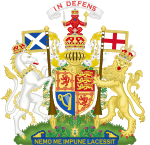- Court of Exchequer (Scotland)
-
Scots law

This article is part of the series:
Law of ScotlandAdministrationCivil courtsCriminal courtsSpecial courtsCriminal prosecution- Lord Advocate
- Crown Office
- Advocate Depute
- Procurator Fiscal
-
-
- Fiscal fine
- Precognition
-
Legal profession- Faculty of Advocates
- Law Society of Scotland
- Solicitor-Advocate
- Solicitor
- Association of Commercial Attorneys
The Court of Exchequer was formerly a distinct part of the court system in Scotland, with responsibility for administration of government revenue and judicial matters relating to customs and excise, revenue, stamp duty and probate. Its judicial functions are now carried out by the Court of Session.
History
The date of establishment of the Court of Exchequer is unknown because of the loss of ancient records. Originally, Crown revenues were managed by overseers who came to be known as the Lords Auditors of the Checker, later King's Compositors, then Lords of Exchequer.
Article 16 of the Act of Union 1707 provided:
- "And that there be a Court of Exchequer in Scotland after the Union, for deciding Questions concerning the Revenues of Customs and Excises there, having the same power and authority in such cases, as the Court of Exchequer has in England And that the said Court of Exchequer in Scotland have power of passing Signatures, Gifts Tutories, and in other things as the Court of Exchequer in Scotland hath; And that the Court of Exchequer that now is in Scotland do remain, until a New Court of Exchequer be settled by the Parliament of Great Britain in Scotland after the Union;"[1]
The new Court of Exchequer was established by the Exchequer Court (Scotland) Act 1707. It provided that the judges of the Court were to be the Lord High Treasurer of Great Britain and such other persons who might be appointed by royal commission and who were known as the Chief Baron of Exchequer and Barons of Exchequer. The number of Barons of Exchequer was limited to five. The Court's jurisdiction related to customs and excise and matters of revenue, stamp duty and probate.[2]
In 1856 the jurisdiction of the Exchequer Court was transferred to the Court of Session, which became the Court of Exchequer in Scotland.[3] One of the Lords Ordinary in the Outer House of the Court of Session was to be Lord Ordinary in Exchequer Causes, this was restated by the Court of Session Act 1988.[4] [5] In modern times the business of the court consists in the main of appeals on law from the determination of the Special Commissioners of Income Tax on issues of liability to tax.
Chief Baron of the Court of Exchequer
- James Ogilvy, 4th Earl of Findlater (1707-1708)
- John Smith (1709-1726)
- Matthew Lunt (1726-1741)
- John Idle (1741-1755)
- Robert Ord (1755-1775)
- Sir James Montgomery of Stanhope (1775-1801)
- Robert Dundas of Arniston (1801-1819)
- Sir Samuel Shepherd (1819-1830)
- James Abercromby (1830-1832)
References
- ^ Section XIX, "And that there be a Court of Exchequer in Scotland after the Union, for deciding Questions concerning the Revenues of Customs and Excises there, having the same power and authority in such cases, as the Court of Exchequer has in England":
 Act of Union 1707 at Wikisource.
Act of Union 1707 at Wikisource. - ^ History of the Court: "Exchequer records". National Archives of Scotland. http://www.nas.gov.uk/guides/exchequer.asp. Retrieved 2007-11-20.
- ^ "The whole power, authority, and jurisdiction at present belonging to the Court of Exchequer in Scotland, as at present constituted, shall be transferred to and vested in the Court of Session, and the Court of Session shall be also the Court of Exchequer in Scotland": "Exchequer Court (Scotland) Act 1856". UK Statute Law Database. http://www.statutelaw.gov.uk/content.aspx?LegType=All+Primary&PageNumber=99&NavFrom=2&parentActiveTextDocId=1040864&ActiveTextDocId=1040867&filesize=591. Retrieved 2007-11-26.
- ^ Section 3, Exchequer causes - "One of the judges of the Court who usually sits as a Lord Ordinary shall be appointed by the Court by act of sederunt to act as Lord Ordinary in exchequer causes, and no other judge shall so act unless and until such judge is appointed in his place": "Court of Session Act 1988". Office of Public Sector Information. http://www.opsi.gov.uk/acts/acts1988/plain/ukpga_19880036_en#pt1-l1g3. Retrieved 2007-11-20.
- ^ Rules of court: "Chapter 48 - Exchequer causes". Scottish Court Service. Archived from the original on 2007-11-01. http://web.archive.org/web/20071101095058/http://www.scotcourts.gov.uk/session/rules/Chapter48.asp. Retrieved 2007-11-20.
Categories:- 1856 disestablishments
- 1856 in law
- 19th century in Scotland
- Court of Session
- Scottish court systems
- Legal history of Scotland
- Lord Advocate
Wikimedia Foundation. 2010.
